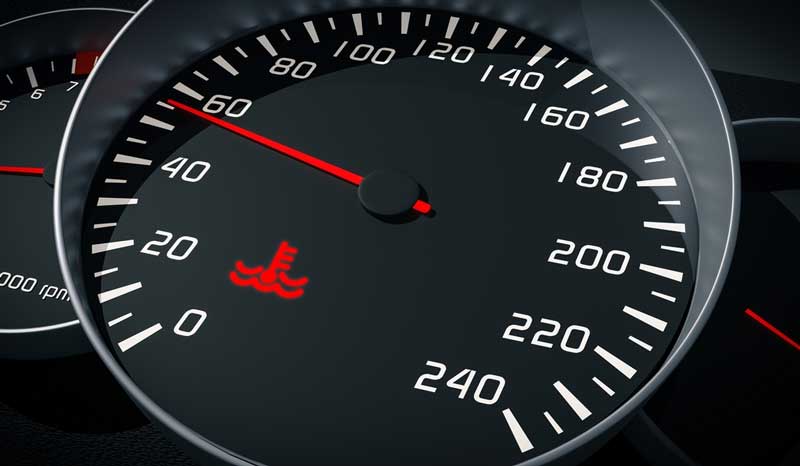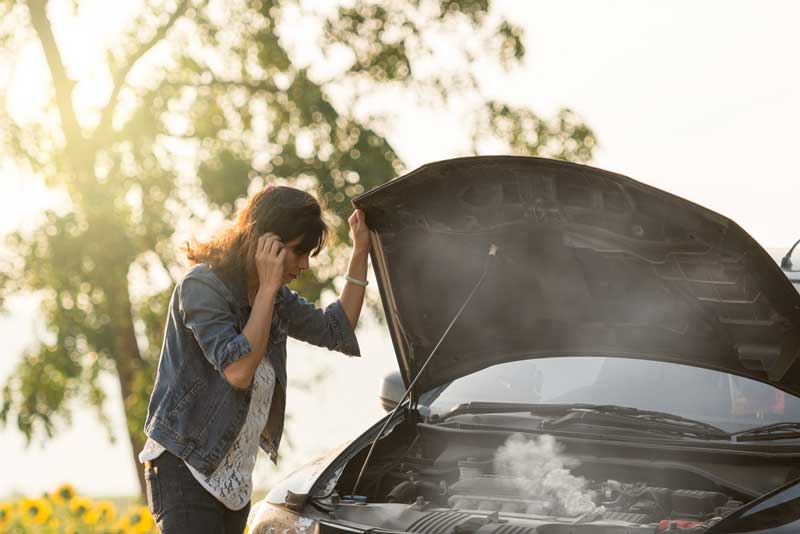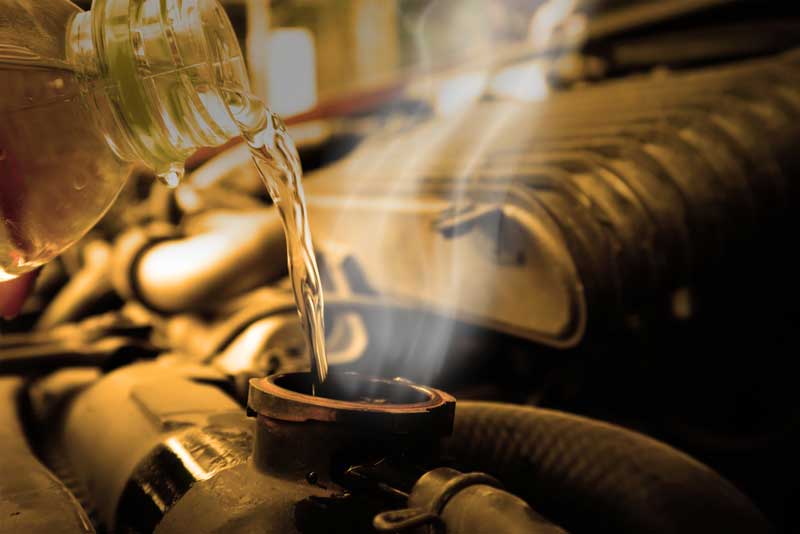Does your car overheat when AC is on? Do you want to find out why and how to fix it?
Reading through this content, you get to know all reasons why your car overheats when AC is on.
This problem could result from coolant leaks, a damaged fan, or even a faulty cooling system. This could result in taking your car to a mechanic, but first, let’s get all the ideas you will need.
This article will explain why your car is overheating when the air conditioner is turned on, and what you can do to fix the issue.
Let’s get started!
Why a Car Overheats When AC Is On
If your car overheats when AC is on, it could be a direct result of a failed condenser. However, a more common reason is that debris and dirt could be trapped in the condenser’s fins. The heat transfer process would not be as efficient as it should be if the condenser fins are obstructed.
Here are some of the common symptoms of car overheating when AC is turned on:
The car’s interior components feel hot
When you feel the car’s interior components get hot, it’s a sign the car is overheating with AC on. Also, your car or AC might produce a burnt smell, if you feel the car is hot. This tells that your car is overheating when you are on the AC.
Car’s temperature gauge
Reading a car’s temperature gauge is handy, to tell if your car overheats when AC is on. Your car’s temperature gauge measures the temperature of the engine’s coolant. Your car’s average temperature should be between 195 degrees and 220 degrees, which you will see in your car’s temperature gauge. So, if your car’s temperature gauge reads higher than 220 degrees, that’s a sign that your car is overheating with AC on.
The car engine shuts down
The car shuts down automatically when it overheats, not minding what the cause of the problem might be. So when the AC is turned on, and your car engine suddenly shuts down, it indicates the AC has a problem that overheats your car.
A cloud of steam released from under the hood
A steam cloud from the car’s hood is one traditional way to know your vehicle is overheating. However, indicating if your car is hot this way, remains very useful. So anytime a cloud of steam comes out from the hood of your car, check your car for overheating problems.
These are useful and the most common signs, that tell if your vehicle is overheating with AC on. Before you take any step towards your car which overheats with AC on, you need to be sure of what’s causing the problem in the car. This is why you’re meant to be knowledgeable, on the signs a car displays when it overheats with AC on.

What Are the Factors That Causes Car to Overheat When AC Is On?
Six most common reasons, why a car overheats when AC is turned on include:
- Overloading the AC Compressor
- Faulty Cooling System
- Problems with Radiator
- Faulty vehicle components
- Sensor or engine coolant being defective
- Faulty Fan
1. AC Compressor Overload
The AC compressor when overloaded with multiple functions, is one common reason a car will overheat with AC on. When the AC is turned on, the compressor works with the engine, and compresses a refrigerant cylinder, creating huge pressure on the engine.
We already know that the car AC system draws significant power from the engine. And when you put high loads on the compressor, more than it can handle, the car engine will eventually overheat. This high load makes the AC compressor bad, preventing the AC from producing cold air. A heated car engine makes the entire car overheat, in a short period.
2. Issues with Radiator
The coolant is passed into the engine, with the help of the radiator. This shows that the radiator plays an important role in the car. When the coolant is passed through the radiator’s metallic fin to the engine, it helps the car operate properly. Anytime the radiator’s work is disrupted, the car overheats when the AC is turned on.
Whether it’s a dysfunctional metallic fine or a faulty radiator, it’s always good to check your radiator whenever you notice the car is overheating, when you turn on your AC.
3. Bad Cooling System
The cooling system plays a very important role in the AC system. Its job is to keep the AC condenser cool. If you turn the heating AC on, it is cooled down by a cooling system, and cold air is provided. When you have a clogged cooling system, the temperature of the condenser rises. Therefore, the vehicle will overheat when you turn on your AC, with air with a high condenser temperature.
Another reason for clogging is when condenser tubes or radiator gets clogged with time. The corrosion and tubes or particles could cause the area to be clogged. You should check out for this anytime the engine temperature is high, and the AC is on. Remember, another devastating problem in a car is clogging. The condenser and radiator in the vehicle can help you figure out why your car’s overheating.
4. Fault Fan
The car could overheat when the engine fan is faulty, and AC is turned on. The problem can occur when the condenser and radiator lack airflow. The fins, condenser, and radiator could be blocked, or the fan could break. Ultimately, this issue will cause the failure of the fan switch, and it can make the car overheat while AC is idle and on.
When the vehicle overheats at idle or slow speed, the main cause can be the engine fan because if your engine fan is bad or clogged, it’ll not be able to blow air to the engine.
5. Fault in-vehicle Components
Faulty components in the car are very common. The faulty components can cause overheating when the AC is on. If the evaporator, refrigerant, condenser, and compressor doesn’t work properly, the AC gets the pressure, thereby increasing the car’s temperature.
To avoid this problem, check the components regularly to be sure they work effectively. Also, don’t forget that a small faulty component could cause problems in the car.
Always check the car’s components, anytime you’re at a mechanic workshop. The mechanic can help you do it, and tell you your car’s components’ working efficiency.
Many vehicles overheat when the AC is turned on for these six most common reasons above. So, when your vehicle overheats with AC on, do check these. However, the most common reasons for this problem are a damaged water pump and a clogged radiator in the car.
6. Defective Engine Coolant Sensor
Engine coolant temperature sensors are rarely the cause of this, but I’ve seen many vehicles overheating with their AC on, because of a faulty engine coolant sensor. You can measure the coolant temperature, and compare it to the temperature indicator you’ll find on your dashboard, to ascertain if the sensor is faulty
The engine can overheat if the temperature goes up and it still reads normal. So you’ll have to check if the thermostat is functioning. It may be why your car has overheating problems when you turn on your AC.
You might have to seek a professional or replace the defective engine coolant temperature sensor, to fix the problem.
How to Fix Car Overheating When Its AC Is On?
- Sometimes the AC refrigerant isn’t compatible with the particular model of car. So check the compatibility well if it recently changed, and change it again when needed. This can be done with a mechanic’s help, or by yourself using proper knowledge and gear.
- When your engine’s cool, check the radiator cap to find out if it’s functioning properly. Clean the debris off the radiator, and check the radiator pressure using its testing kit. This helps you find out if there’s a coolant leak. Hoses or clamps that need replacement, should be replaced.
- Avoid overheating problems, by changing antifreeze every two years. This step is an excellent remedy for preventing corrosion and increases the car’s durability.
- The air is trapped in the coolant system sometimes, resulting in the car’s increased temperature. Flush the car’s system to release trapped air, so that the car can come to its normal temperature.
- Ensure you fill the radiator with coolant. Do not mix up with regular water unless in an emergency. Don’t touch the radiator when the engine is still hot, or when it’s releasing any steam. You have to wait for the engine to be cool.
- When the engine overheats, wait till the engine is cool, and then check the fluid level of the radiator. If it is low, add water when needed. Fix any leak later, and replace radiator fluids with about fifty percent coolant and fifty percent distilled water, don’t use tap water.
- The air conditioning compressor can be checked, by checking if the proper voltage gets to wires using a multimeter, looking for damages, checking the compressor clutch, and listening for any noise.
- Clean any clogged fin, and inspect for blockages throughout all areas, use a temperature reader to check the condenser. The videos below will help you with this and other AC problems.
- To check the water pump, find out if there’s any damage on the pump, strange sounds, loose pulley, check for wear on the belt, and leaks on the floor under your pump or in the pump.

What to Do if You Are in Traffic and Your Car Overheats
The problem could be more stressful when you’re stuck in long traffic. When you’re in this kind of situation, follow the following tips:
- Pull over immediately. It’s safe to stop.
- If you cannot pull over, turn the AC off, and on getting to the stop light, you’ll have to decide if it’s safe to put your car in park or neutral. This may help your engine cool down a bit.
- Adjust the car’s air conditioning temperature to red zone or hot, and increase your blower speed. As much as it can be uncomfortable, it’ll help dissipate the heat.
- Put your car in the park immediately; you can safely pull over, then turn the engine off but leave your key mode to be on “on”, because it will make the fan keep running for some models of cars. If the fan is not on, then you’ll have to replace your fan, or it’ll become part of the issues we mentioned earlier.
- If it’s safe, open the car hood. If there’s steam coming from the car, wait a while. If your car hood is still hot, then wait till it’s safe for you to open. Excess heat from the engine could be let out.
- In 30 minutes, when the engine is possibly cool, check out for leaks or get help. You can try to patch up the leak, using radiator hose tape or tighten the clamp, then fill the radiator with coolant or distilled water. This fix is temporary, so the engine should be checked fully to find all issues.
Also Read: Temporary Fix for Crankshaft Position Sensor (Expert Guide)
Frequently Asked Questions – Car Overheats When AC Is On
Can AC cause overheating?
One/two possibilities can cause your engine to overheat, while AC is on. One is an increase in engine load, which is caused by a failing AC compressor. The air conditioning compressor adds rotational loads to your engine, and when the compressor wears and becomes increasingly hard to turn, it can cause overheating of the engine.
Why does my car overheat when idling with the AC on?
One of the most common causes of overheating in an engine with AC on when idling is a partially broken compressor unit. So, when the car is idle, and the AC blows hot air, the pulley or compressor is possibly failing though it’s not broken completely yet.
Can a bad AC compressor cause the car to overheat?
The compressor alone can’t cause the car to overheat. However, when the compressor’s clutch is engaged, and the compressor drags to properly function, the added strain on your engine can make the car overheat.
Why does my car overheat when my AC is on?
A vehicle can overheat even when the AC is turned on, and you are driving slowly or stuck in long traffic. This problem gets triggered when your cooling fan (fan clutch, cooling motor, or all other components responsible for the fan working included) has a fault.
Should I turn on AC if the car is overheating?
Turn the car’s AC off immediately after its temperature gauge begins to rise. This is because the AC makes the engine work harder, making the engine overheat faster.
Conclusion – Car Overheats When AC Is On
The problem of cars overheating with the AC on is very common, and you can find the solutions with some effort and time. The remedies mentioned above might help if you’re willing to put effort into work and research.
After trying your solutions and your car keeps on overheating with AC on, seek help from a trusted service center. Don’t ignore the problem, as it could cause major damage to the car. Your priority should be finding a solution to help save money and time.

